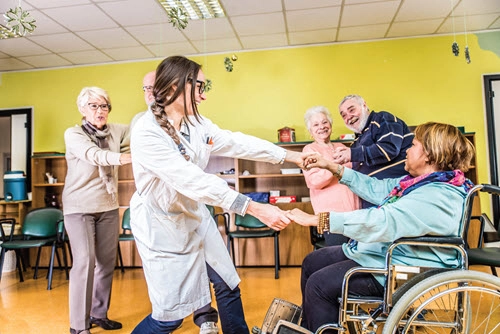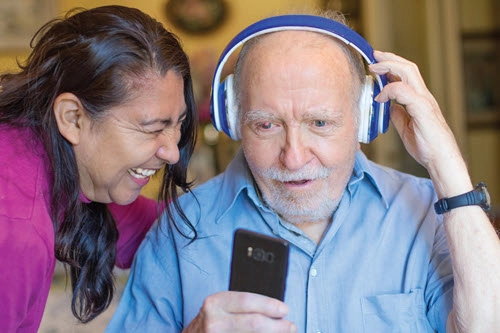Performing Rights Organizations Unsympathetic to Nursing Home Unlicensed Music Use
Make sure your facility purchases licensing options if playing music in a ‘public’ space. Science shows that music can help reduce anxiety, promote healing or relaxation, and even transport listeners to other times and places, so playing music in nursing homes makes perfect sense. But some nursing homes have found themselves courting legal liability for doing so. If you are playing music in a “public” space in your facility without the appropriate licensing, you may be on the wrong side of federal copyright laws. See How You Fare in These Scenarios Evaluate your understanding of the rules and regulations surrounding music by determining whether the following scenarios are true or false. Scenario 1: You’ve purchased a personal subscription to Pandora or Spotify and use your account to play music through a Bluetooth speaker at the nurse’s station. You pay for the subscription service, so it’s legal to play the music when and where you choose. Answer: False. The fine print in the terms of use (the agreements that you must check in order to proceed with your purchase of the service) specifies that using such services in a commercial setting violates the terms of use. “Just in case you’re thinking, ‘Well I already have a premium account, and who’s going to notice anyway,’ you should know that artists, and the music licensing companies that have the rights to distribute their music, are notoriously aggressive when it comes to asserting their copyrights,” says attorney Christopher Coble, in online analysis on the FindLaw Free Enterprise blog. Pandora tries to make that clear (emphasis original): “ANY BUSINESS USE OF THE SERVICES NOT SPECIFICALLY PERMITTED IN THIS SECTION IS STRICTLY PROHIBITED AND MAY RESULT IN IMMEDIATE TERMINATION OF YOUR RIGHT TO USE THE SERVICES.” Pandora does offer a business version, which is called Pandora for Business, and requires users to meet certain conditions. Spotify has similar terms: “You promise and agree that you are using the Spotify Service and Content for your own personal, non-commercial use and that you will not redistribute or transfer the Spotify Service or the Content.” Spotify also has a business-legal branch, which is now called Soundtrack. Scenario 2: You can legally play original content or public domain music. Answer: True. You can play music (or broadcast films) that are part of the public domain. New works enter the public domain every year on January 1, though the laws pertaining to different types of work differ slightly. As of Jan. 1, 2022, works including novels, films, and musical compositions from 1926 are available, as are an estimated 400,000 sound recordings from before 1923, says Jennifer Jenkins, director of Duke University’s Center for the Study of the Public Domain. The laws governing music specifically are especially wonky, with compositions being regulated differently than recordings. Check information with a professional association, because, while a song may have been written before 1923 and recorded by the same artist several times over a couple decades, only the recordings made before 1923 are legally playable without risk of fine or fee. Here are some examples of recordings that entered the public domain in January, https://www.arsc-audio.org/publicdomainpre23.html and here’s a deeper dive into how and when works enter the public domain. Scenario 3: You can plop down an old-fashioned broadcast radio in your activity room and let the radio stations choose the music and pay the license fees. Answer: Depends. If your facility is less than 2,000 square feet or if it’s larger than 2,000 square feet — but uses fewer than six speakers or TVs, with four or fewer in any one room, and you play only “terrestrial” broadcasts — you may not have to pay any additional licensing fees, says the National Federation of Independent Business. “Note that this exception is not limited to consumer-type radios, but the business can only play [Federal Communications Commission] FCC licensed radio or TV (cable and satellite TV count as TV too). No CDs, no hooking up to an iTunes library, and no streaming services. If a business plays any of these other services, or features live music, then they must get public performance licenses,” says attorney David Oxenford, partner at Wilkinson Barker Knauer LLP in Washington, D.C., in online analysis. Understand the Regulations Music that is not already part of the public domain is copyrighted and subject to federal copyright protections, including payment for use. Background: There are three major performing rights organizations (PROs) in the United States: American Society of Composers, Authors, and Publishers (ASCAP), Broadcast Music Inc. (BMI), and SESAC (which used to stand for Society of European Stage Authors and Composers). These entities ensure that music artists are paid by collecting royalties for public performances. Public performances include on the radio, on television, and at venues or other spaces. Businesses that play music for their customers are supposed to purchase licenses to do so; each PRO represents certain artists, so gaining licensure with just one PRO means you are limited to only songs within their catalogue. This issue is growing even more complicated due to a U.S. Department of Justice investigation into the antitrust consent decrees between two of the PROs, BMI and ASCAP, which could affect licensing. Because the copyright laws surrounding music broadcast focus on how many people can listen, especially the public, long-term care facilities are sort of a gray area to navigate. For example, playing music across a sound system in a facility’s hallways or in an activity room for residents and their families without licensure may violate copyright law, but a resident playing a personal device in their room is probably fine. “The assessment turns not on the actual number of persons in a location at any given time, but rather the capacity for such persons,” says attorney Christopher C. Puri, counsel at Bradley in Nashville, in online analysis. Know Fines, Lawsuits are Possible The three PROs are out to enforce their claims on royalties for music, and healthcare offices and facilities, including nursing homes, are definitely within their scope for enforcement. BMI explicitly states that healthcare facilities require music licenses. “Playing music, whether it’s live, recorded, or on radio and TV programs in your rehabilitation areas, lobbies, or other areas of your healthcare facility, is not free and requires the necessary copyright clearance to ensure that the creators of the music can continue to write it,” says BMI. Even if your facility is independent and tiny, and you’ve been getting away with using your personal streaming service subscription for years for social activities, you may be living on borrowed time. “All of the performing rights organizations have contractors who travel the country, checking out retailers, bars, restaurants, and other commercial establishments to make sure that they are following the rules,” Oxenford says. Although healthcare facilities may not jump out as a major focus point compared to a bar or nightclub, PROs may be refocusing their efforts. “Insiders have found a recent rise in the number of medical buildings and offices being targeted by PROs looking for the use of unlicensed music,” says Cloud Cover Music, a music provider that works with medical institutions and other businesses. PROs can hit businesses with cease-and-desist letters, but they can also file lawsuits against individual businesses for copyright infringement, says Joy Butler, an attorney based in Washington, D.C., in online analysis for Law360. Bottom line: Playing music in your facility without doing due diligence on the legality of the source can be risky, expensive, and be a source for more headaches than fun.


